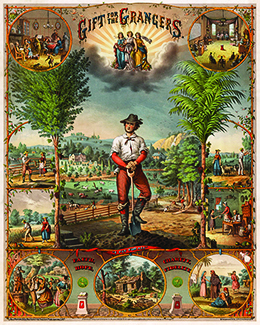| << Chapter < Page | Chapter >> Page > |
One of the first efforts to organize farmers came in 1867 with Oliver Hudson Kelly’s creation of the Patrons of Husbandry, more popularly known as the Grange . In the wake of the Civil War, the Grangers quickly grew to over 1.5 million members in less than a decade ( [link] ). Kelly believed that farmers could best help themselves by creating farmers’ cooperatives in which they could pool resources and obtain better shipping rates, as well as prices on seeds, fertilizer, machinery, and other necessary inputs. These cooperatives, he believed, would let them self-regulate production as well as collectively obtain better rates from railroad companies and other businesses.

At the state level, specifically in Wisconsin, Minnesota, Illinois, and Iowa, the Patrons of Husbandry did briefly succeed in urging the passage of Granger Laws, which regulated some railroad rates along with the prices charged by grain elevator operators. The movement also created a political party—the Greenback Party , so named for its support of print currency (or “greenbacks”) not based upon a gold standard—which saw brief success with the election of fifteen congressmen. However, such successes were short-lived and had little impact on the lives of everyday farmers. In the Wabash case of 1886, brought by the Wabash, St. Louis, and Pacific Railroad Company, the U.S. Supreme Court ruled against the State of Illinois for passing Granger Laws controlling railroad rates; the court found such laws to be unconstitutional. Their argument held that states did not have the authority to control interstate commerce. As for the Greenback Party, when only seven delegates appeared at an 1888 national convention of the group, the party faded from existence.
Explore Rural Life in the Late Nineteenth Century to study photographs, firsthand reports, and other information about how farmers lived and struggled at the end of the nineteenth century.
The Farmers’ Alliance , a conglomeration of three regional alliances formed in the mid-1880s, took root in the wake of the Grange movement. In 1890, Dr. Charles Macune, who led the Southern Alliance, which was based in Texas and had over 100,000 members by 1886, urged the creation of a national alliance between his organization, the Northwest Alliance, and the Colored Alliance, the largest African American organization in the United States. Led by Tom Watson, the Colored Alliance, which was founded in Texas but quickly spread throughout the Old South, counted over one million members. Although they originally advocated for self-help, African Americans in the group soon understood the benefits of political organization and a unified voice to improve their plight, regardless of race. While racism kept the alliance splintered among the three component branches, they still managed to craft a national agenda that appealed to their large membership. All told, the Farmers’ Alliance brought together over 2.5 million members, 1.5 million white and 1 million black ( [link] ).

Notification Switch
Would you like to follow the 'U.s. history' conversation and receive update notifications?